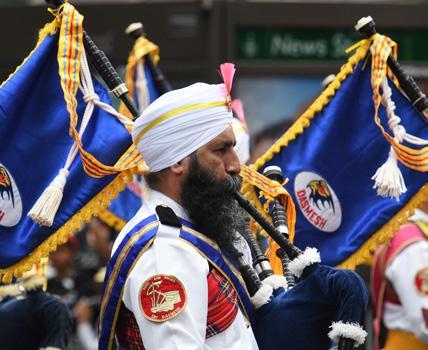
2 minute read
YOUR SAY
from 2018-06 Adelaide
by Indian Link
Anzac Day 2018
RAJNI ANAND LUTHRA wrote about Indian veterans seeking acknowledgement for their service, on the occasion of ANZAC Day 2018 Bawa Singh Jagdev OAM wrote: The Anzac Day march (originally the Battle of Gallipoli or the Dardanelles Campaign) story was a good piece of journalism. But more should have been said about the battle of Gallipoli and the forces who fought in it, as the March was mainly to honour those men and women who made the supreme sacri ces when the ill-conceived strategy of Winston Churchill to control the sea route from Europe to Russia during World War I began with a failed naval attack by British and French ships on the Dardanelles Straits in February-March 1915. Although the Sikhs and Gorkhas fought together side by side with the ANZAC and nine Sikhs were enlisted in the Australian army in WW1, the request by the National Sikh Council to march in the ANZAC Day parade to honour those Sikhs was arrogantly refused until Council showed the NSW RSL the pictures of Sikhs in Gallipoli and the statements of their gallantry by Commander Ian Hamilton. Only then the RSL in 2007 allowed the descendants of the Sikhs who fought in Gallipoli to march. Coming back to your article, not much was written about the Sikhs in the battle of Gallipoli. A major part of the article was devoted to those Indians servicemen who fought in the local battles with Pakistan after 1947, which has nothing to do with any World War. Even casually reading through the statements of Hamilton, his experience and assessment of the Gallipoli battle and his recommendations will give a journalist a better and unbiased view of the subject.
I am not criticising your views, which are quite educational, but in my opinion, the contents don’t do justice to the purpose of the article. It would perhaps be a good article on the Indian Republic Day as it talks about the services of the Indian Army that fought in various battles after 1947 and not in Gallipoli, WW1 or WW2.

There are several Gallipoli monuments in various cities in India but they were established by the then British government that valued the sacri ces of the soldiers who fought the battle. Yes, India should organise its own march to celebrate its soldiers’ sacri ces but that is politics and it will never happen. On the centenary of the battle of Gallipoli, the Council requested the Indian foreign of ce in writing to send an Indian military band to celebrate the occasion so that they could march behind the band, but the request fell on deaf ears and was never even acknowledged. Editor replies: Thank you very much for your comments. The purpose of the article this year was not to reprise the Sikh (and other) involvement at ANZAC Cove. We have done this many times before, and the service and sacri ce of Indian soldiers in 1914-15 is well known and fully acknowledged now. Our article this year was about the sense of appreciation that ANZAC Parade marchers feel, and whether they would like to see such acknowledgement given to armed services personnel in India. Everyone we spoke to agreed that such acknowledgement will be welcome.
We felt that our ANZAC Day coverage this year should go over and beyond the march itself, since it is more than 10 years now that a separate Indian contingent has been marching. We made it a national report by including input from all major centres across the country.








